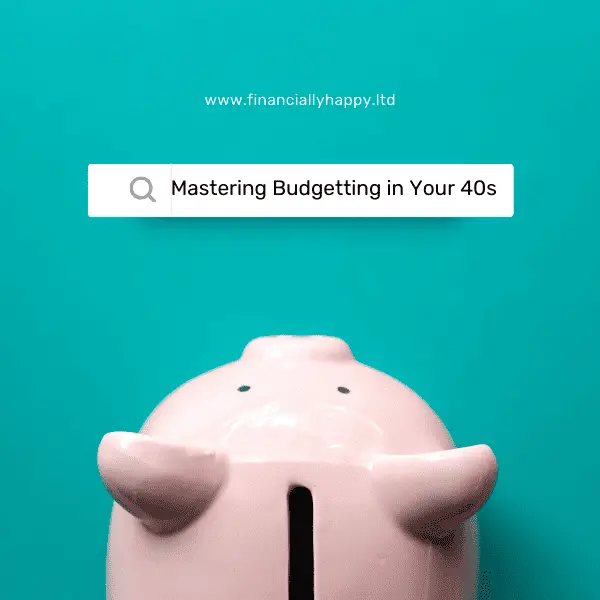Why am I always skint? 5 things to change now to break the pattern
Why am I always Skint?
Are you always feeling like you’re running low on funds, no matter how much money you make?
Do you struggle to save money, even though you know you should?
You might be skint all the time because you don’t have clarity on your goals, you’re spending more money than you earn, not budgeting properly, not earning enough money, or you’re not managing your finances that well.
However, you’re not alone. Millions of people find themselves in the same boat every month, wondering where all their money went.
But there is hope. In this post, we’ll explore some of the reasons why people are chronically skint, and we’ll also offer some solutions on how to break the cycle.
So read on for tips that can help you get your finances in order and start building a savings account that will give you peace of mind.
Table of Contents

Sick of being skint
Being constantly strapped for cash can be both mentally and emotionally draining.
When you’re sick of being skint, every day can feel like an uphill battle as you try to stretch your budget to cover basic necessities.
The constant worry about making ends meet can take a toll on your mental health and relationships. It can also limit your ability to participate in social activities, further isolating you.
However, recognizing that you’re fed up with this situation is often the first step towards change. It can be the catalyst that drives you to explore new avenues for increasing your income, managing your finances more effectively, and ultimately improving your quality of life.
Answering the question, Why am I always skint might be the first step in th process.
| Reason for Being Skint | Description | Action to Take |
|---|---|---|
| Overspending | Spending more than your income can lead to financial difficulties. | Create a budget and stick to it. Prioritize needs over wants. |
| Lack of Savings | Not having a savings buffer can lead to financial stress during emergencies. | Start saving a small amount regularly. Aim to build an emergency fund. |
| High Debt | Without a financial plan, losing track of your money is easy. | Develop a debt repayment plan. Consider seeking advice from a financial advisor. |
| No Financial Planning | Without a financial plan, it’s easy to lose track of your money. | Set financial goals and create a plan to achieve them. |
| Impulse Buying | Buying items on impulse can quickly drain your finances. | Practice mindful spending. Ask yourself if you really need an item before buying it. |
| Lack of Income | If your income is low, it may not cover all your expenses. | Look for additional sources of income, such as a part-time job or freelance work. |
You may not have clarity on your goals
When it comes to managing your finances, it’s important to have clarity on your goals.
If you don’t know where you are trying to get to, who knows where you will end up.
Just wanting to be richer is not a clear goal; if you find 1$£ on the floor, you are now richer!
Without clear goals, it can be difficult to make progress financially. When you’re unsure what you want to achieve, it’s easy to get side-tracked and unnecessarily spend money.
Tips for setting clear financial goals:
– Figure out what you want to achieve in the core areas of your life, health, wealth and happiness
– Make a plan for what you want your life to look like
– Set a timeframe
– Track your progress review and adjust as necessary.
Having clear goals is important because it gives you direction and helps you stay on track.
You’re less likely to overspend or make other financial mistakes when you know your goals. So, take some time to figure out your goals and then put a plan in place to help you achieve them!
What financial goals should you set?
This will be specific to you and your circumstances, but some good options include saving for:
- An emergency fund of at least 3-6 months living costs
- investing to make work optional one day
- Getting out of debt.
- A house deposit.
- Improving your skills and qualifications
- Start-up capital for a business
- That round the world trip
Choosing goals that are important to you and that you’re motivated to achieve in the short, medium and long term is important.

You may be spending too much money on unnecessary things
If you are skint all the time, it probably means you live beyond your means.
If you always spend more than you earn, you will have to work for money FOREVER.
Creating that gap between income and outgoings is vital to stop being skint all the time.
There are a few things you can do to help you live within your means:
Track your spending to know where all your money is going.
– Make a budget – so you are setting where you want your money to go
– Prioritize your expenses – be clear on the difference between your wants and needs
– Cut down on unnecessary expenses – get rid of all expenses that are providing poor value to you or are actually a waste of your money right now.
You may not be earning enough money
Another factor is that you might not be earning enough for what life is currently costing you
If you’re not earning enough money, it can be difficult to keep up with your expenses and save for your future.
Increasing your earning power is going to be one of the most powerful ways to move you away from always being broke.
You could
-Ask for more money – but you will need to prove why you are worth it.
-look for a better-paid job
Improve your skills, experience, and qualifications to improve your earning power.
Here are a few more things you can do to earn extra money:
– Get a part-time job
– Sell items you no longer need online or at a garage sale.
– Do odd jobs for people in your community
– Invest in a side hustle, something you are good at, like doing, the world needs and people will pay you for.
All of these and many more can help you to increase your earnings.

You may not be managing your finances well
When it comes to having or not having much money, it comes down to the way you manage your money.
This means making sure you’re not spending more than you earn, going into debt, or wasting money on unnecessary things. If you want to get ahead financially, you need to be good with your money.
Here are a few ideas for managing your money better:
– Make a budget and stick to it. This will help you track your spending and ensure you’re not overspending.
– Invest in yourself. Take some time to learn about personal finance and investing. The more you know, the better equipped you’ll be to make smart financial decisions.
– Live below your means. Don’t try to keep up with the Joneses. Spend only what you can afford and save the rest.
– Make a plan. Set financial goals and work towards them. Having a plan will help you stay on track and reach your goals.
– Be disciplined. Discipline is key when it comes to managing your finances. Stay focused, and don’t let yourself get off track.
The way you manage your money will be the key to building wealth over the long term or staying broke forever. It’s your choice.
You may have some bad financial habits
Your money habits are going to be one of the biggest reasons you are skint all the time.
Behaviour is a far greater part of becoming wealthy or staying skint than technical knowledge.
You can be very clever but spend all your money all the time = skint
You can have average intelligence but have good money habits = wealthy in the long run
Here are a few bad financial habits to avoid :
– Spending more than you earn
– Not budgeting properly
– Going into debt for things that will lose money over time
– Wasting money on unnecessary things to impress people you don’t really like
– Not saving enough money
– comparing yourself to others and trying to live their lifestyle
– shopping for fun, whether online or in real life
– chasing the latest shiny thing or investment
If you can break these bad financial habits and start following some good ones, you’ll be on your way to financial stability in no time!
FAQ Why am I always skint
Why am I always short on money?
You may be always short on money due to overspending, inadequate income, high debts, lack of budgeting, or unexpected expenses.
Why do I always get broke?
You may consistently find yourself broke due to a variety of factors.
Firstly, living beyond your means by spending more than you earn can quickly deplete your finances.
Secondly, the absence of a budget may lead to uncontrolled spending. Impulsive buying, especially on non-essential items, can also contribute to financial strain.
Additionally, a significant portion of your income might go towards repayments if you have high debt levels. The lack of a savings plan means you have no financial cushion for emergencies, which can force you to spend money you don’t have.
Lastly, unexpected expenses can arise, further straining your budget.
How do I stop being so bad with money?
To stop being bad with money, you can take the following steps:
Create a Budget: Understand your income and expenses. Create a budget that allocates portions of your income to necessities, savings, and discretionary spending.
Build an Emergency Fund: Save money for unexpected expenses. Aim to have three to six months’ worth of living expenses in a savings account.
Cut Unnecessary Expenses: Identify areas where you can cut back, such as subscriptions you don’t use, eating out less, or finding more affordable alternatives.
Avoid Impulse Purchases: Make a shopping list before you go shopping and stick to it. Avoid making purchases on a whim.
Use Credit Wisely: Be mindful of how you use credit cards. Avoid accumulating debt on things that are not essential.
Seek Financial Education: Educate yourself on personal finance. Many books, courses, and resources are available to help you understand how to manage your money better.
Set Financial Goals: Have clear short-term and long-term financial goals. This will give you a sense of direction and purpose in your financial decisions.
Track Your Spending: Regularly monitor your spending. There are apps and tools that can help you keep track of where your money is going.
Increase Your Income: Look for ways to increase your income through side gigs, freelancing, or even asking for a raise.
Seek Professional Advice: If you’re struggling to manage your finances on your own, don’t hesitate to seek the help of a financial planner or coach.
Remember that improving your financial habits is a gradual process. Be patient with yourself and make small, consistent changes.
Why do I feel like I can’t get ahead financially?
Feeling like you can’t get ahead financially can be attributed to several factors:
Stagnant Income: If your income hasn’t increased over time but your expenses have, it can be difficult to make financial progress.
High Debt: A large debt can consume a significant portion of your income, leaving little for savings or investments.
Lack of Budgeting: Without a budget, you may not clearly understand where your money is going, making it hard to control spending.
Living Paycheck to Paycheck: If you’re using most of your income to cover immediate expenses, there’s little left to save or invest for the future.
Unexpected Expenses: Emergencies or unexpected expenses can derail your financial plans, especially if you don’t have an emergency fund.
Lifestyle Inflation: As your income increases, you might also increase your spending on non-essential items, negating the potential financial benefits of earning more.
Lack of Financial Goals: Without clear financial goals, it’s difficult to stay motivated and make decisions that contribute to financial progress.
Economic Factors: External factors such as inflation, job market conditions, or economic downturns can also impact your financial situation.
Psychological Barriers: Sometimes, mental barriers or a mindset of scarcity can prevent you from taking steps to improve your financial situation.
Lack of Financial Education: Not having enough knowledge about personal finance and investment options can leave you unsure of how to effectively manage your money.
Addressing these issues through budgeting, setting financial goals, building an emergency fund, seeking financial education, and exploring ways to increase your income can help in gaining financial stability and progress.
Conclusion: Why I am I ways skint?
So, you want to stop being so skint?
The most important thing is to start with a goal in mind – without clarity on what you want, it will be difficult to achieve it.
Once you know where you’re going, budgeting becomes much easier; figure out what expenses are necessary and which ones can be trimmed down or eliminated altogether.
Earning more money is always a plus, so make sure to check out our tips for doing just that. And once you have extra cash flow coming in each month, put it towards savings or investments that will secure your financial future.
Lastly, manage your money better and send it to where you want it to go before any bad financial habits steal it away from you.
Need a Helping Hand with Your Finances? 🤝💰
If you’ve made it this far, congratulations! You’re already taking steps towards a healthier financial future. But maybe you’re feeling a bit overwhelmed. Maybe the thought of budgeting, saving, and investing still makes you break out in a cold sweat. Don’t worry, you’re not alone, and help is available.
At Financially Happy Money Coaching, I understand that money isn’t just about numbers. It’s about emotions, behaviours, and life choices. That’s why we’re here to help you take the stress out of money and build wealth in a way that aligns with your values and lifestyle.
Whether you’re just starting out on your financial journey or you’re looking to take your finances to the next level, we’re here to guide you every step of the way. I’ll help you understand your financial behaviours, set realistic goals, and create a personalized plan to achieve those goals.
So, why wait? Start your journey towards financial happiness today. Remember, the best time to start was yesterday. The second best time is now.
Click here to schedule your consultation and let’s make your money work for you, not vice versa. 💪💰
Remember, financial freedom isn’t a destination; it’s a journey. And every journey is easier when you have a guide. So, let’s embark on this journey together and create a financially happy future. 🚀💸
📚 Financial Freedom Resources
- The Ultimate Guide To Building Your Savings to $100,000! 📘 is a transformative book that equips readers with principles, strategies, and the mindset 🧠 needed to reach a $100,000 savings goal 💰. It’s a journey towards financial freedom 🚀, challenging beliefs 🤔, embracing new habits 🔄, and overcoming obstacles 💪.
- How to Manage Your Finances: Your Guide to Financial Freedom 📘 is a comprehensive resource packed with practical advice on budgeting 💰, investing 📈, reducing debt 💳, and building wealth 💎. It’s an essential guide for anyone, novice or experienced, aiming to take control of their financial future and achieve financial independence 🚀.
- Mastering Budgeting in Your 40s: Your Guide to Financial Freedom 📘 is your essential roadmap to financial savvy. Packed with tips on budgeting 💰, investing 📈, and debt management 💳, it’s the perfect toolkit for anyone in their 40s looking to secure their financial future and sail towards independence 🚀.
Remember, self-study is a powerful tool for life and financial transformation. Happy reading! 🎉









